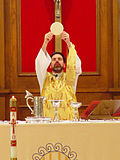- Kyrie
-
Kyrie, a transliteration of Greek κύριε (kyrie), vocative case of κύριος (kyrios), meaning "Lord", is the common name of an important prayer of Christian liturgy, which is also called the Kýrie, eléison (Greek, Κύριε, ἐλέησον, for "Lord, have mercy").
Contents
In Eastern Christianity
Τhe phrase Kýrie, eléison (Greek: Κύριε ἐλέησον) or one of its equivalents in other languages is one of the most oft-repeated phrases in Byzantine-Rite Eastern Christianity.
The various litanies, frequent in that rite, generally have Lord, have mercy as their response, either singly or triply. Some petitions in these litanies will have twelve or even forty repetitions of the phrase as a response.
The phrase is the origin of the Jesus Prayer, beloved by Christians of that rite and increasingly popular amongst Western Christians.
The biblical roots of this prayer first appear in 1 Chronicles 16:34:
...give thanks unto the LORD; for he is good; for his mercy endureth for ever...
The prayer is simultaneously a petition and a prayer of thanksgiving; an acknowledgment of what God has done, what God is doing, and what God will continue to do. It is refined in the Parable of The Publican (Luke 18:9-14), "God, have mercy on me, a sinner", which shows more clearly its connection with the Jesus Prayer.
Since the early centuries of Christianity, the Greek phrase, Kýrie, eléison, is also extensively used in the Coptic (Egyptian) Christian liturgy, which uses both the Coptic and the Greek language.
In Western Christianity
In Rome, the Divine Liturgy was first celebrated in Greek. As Latin became the predominant language, Mass was celebrated in Latin, but the familiar and venerated Greek prayer Kýrie, eléison was preserved, as were Hebrew phrases such as "Alleluia". Jungmann and other scholars conjecture that the Kyrie in the Roman Mass is a vestigial remnant of a litany at the beginning of the Mass, like that of some Eastern churches.
In the Roman Rite liturgy, a variant, Christe, eléison, a transliteration of Greek Χριστέ, ἐλέησον, is introduced. In the Tridentine Mass form of that rite, Kýrie, eléison is sung or said three times, followed by a threefold Christe, eléison and by another threefold Kýrie, eléison. In the Paul VI Mass form, each invocation is made only once by the celebrating priest or by a cantor, with a single repetition, each time, by the congregation. Even if Mass is celebrated in the vernacular, the Kyrie may be in Greek. This prayer occurs directly following the Penitential Rite or is incorporated in that rite as one of the three alternative forms provided in the Roman Missal. The Penitential Rite and Kyrie may be replaced by the Rite of Sprinkling.
"Kyrie, eleison" (or "Lord, have mercy") may also be used as a response of the people to intentions mentioned in the Prayer of the Faithful.
Since 1549 Anglicans have normally sung or said the Kyrie in English. In the 1552 Book of Common Prayer the Kyrie was inserted into a recitation of the Ten Commandments. Modern revisions of the Prayer Book have restored the option of using the Kyrie without the Commandments. In modern Anglican churches it is common to say (or sing) either the Kyrie or the Gloria in Excelsis Deo, but not both. In this case, the Kyrie may be said in penitential seasons like Lent and Advent, while the Gloria is said the rest of the year.
Other denominations also, such as Lutheranism, use "Kyrie, eleison" in their liturgies.
Musical settings
A Gregorian chant Kyrie eleison
In the Tridentine Mass, the Kyrie is the first sung prayer in the Order of Mass. It is usually (but not always) part of any musical setting of the Mass. Kyrie movements often have an ternary (ABA) musical structure that reflects the symmetrical structure of the text. Musical settings exist in styles ranging from Gregorian chant to Folk.
Of 226 catalogued Gregorian chant melodies, 30 appear in the Liber Usualis. In what are presumed to be the oldest versions, the same melody is repeated for the first eight iterations, and a variation used on the final line (that is, formally, aaa aaa aaa'). These repeats are notated by the Roman numerals "iij" (for three times) or "ij" (for twice). The Kyrie for the Requiem Mass in the Liber Usualis has this form. Later Kyries have more elaborate patterns, such as aaa bbb aaa', aaa bbb ccc', or aba cdc efe'. Note that the final line is nearly always modified somewhat; in some cases this may be because it leads into the Gloria better. In forms both with and without literal repeats, most Kyries in the Liber Usualis have a closing phrase used in nearly all of the lines of the text. This in fact parallels the text, as each line ends with the same word "eleison".
Because of the brevity of the text, Kyries were often very melismatic. This encouraged later composers to make tropes out of them, either by adding words to the melisma (as how a sequence is often considered), or extending the melisma. In fact, because of the late date of most Kyries, it is not always clear whether a particular Kyrie melody or the apparently troped text came first; it could just as easily be the case that a syllabic song was converted into a melisma for a Kyrie verse. In some cases, verses interpolate Latin text between each "Kyrie" (or "Christe") and "eleison".
As the Kyrie is the first item in settings of the mass ordinary and the second in the requiem mass (the only mass proper set regularly over the centuries), numerous composers have included Kyries in their masses, including Guillaume de Machaut, Guillaume Dufay, Johannes Ockeghem, Josquin des Prez, Giovanni Pierluigi da Palestrina, Johann Sebastian Bach, Joseph Haydn, Wolfgang Amadeus Mozart, Luigi Cherubini, Franz Schubert, Ludwig van Beethoven, Gabriel Fauré, Hector Berlioz, Charles Gounod, Giuseppe Verdi, Ralph Vaughan Williams, Igor Stravinsky, Leonard Bernstein, Benjamin Britten, Mark Alburger, and Erling Wold. In original settings, Michael Nyman included it in his score for The Libertine and Trevor Jones used it in his score for Hideaway.
Pronunciations
The transliteration of ἐλέησον as "eléison" shows that the non-classical itacist pronunciation of the Greek letter eta (η) is used. Although the Greek words have seven syllables (Ký-ri-e, e-lé-i-son), pronunciations as six syllables (Ký-ri-e, e-léi-son) or five (Ký-rie, e-léi-son) have been used. Text underlay in mediaeval and Renaissance music attests that "Ký-ri-e-léi-son" (five syllables) was the most common setting until perhaps the mid-16th century. William Byrd's mass for 4 voices is a notable example of a musical setting originally written with five syllables in mind, later altered for six syllables.
Mediaeval poetry sometimes has 'Kýrieléis', an even more drastic four-syllable form, used as a convenient rhyme with various words in macaronic poems and songs.
Popular culture
- Quebec rock band Offenbach sang "Kyrie" in their 1972 rock version of the Mass for the Dead at the Oratoire Saint-Joseph.
- The song "The Donor" from Judee Sill's Heart Food album is built around choral arrangements of the Kyrie eleison chant.
- The prayer is also referenced in Tom Lehrer's song, "The Vatican Rag" and throughout Virgin Black's Requiem trilogy.
- The song "Mona Lisa Overdrive", from Juno Reactor's album Labirynth, features a part where Kyrie can be heard.
- In the 1963 film Lord of the Flies, based on the novel by William Golding and directed by Peter Brook, the choir boys sing "Kyrie eleison."
- The vocal group The Association produced a stirring protest song in 1967 to the war in Vietnam, "Requiem For The Masses", that includes a full-harmony bridge "Kyrie, eleison". Their inspiration is possibly from Mozart's Requiem as their song includes other phrases from Amadeus' masterpiece: Rex tremendae majestatis (King of tremendous majesty), and Requiem aeternam (Eternal Rest Grant unto Them).
- In the book and play of "The Phantom of the Opera," "Kyrie Eleison" was the name of the wedding song the Phantom wrote for Christine.
- Phillip K. Dick's novel VALIS invokes Kyrie Eleison.
- The psychedelic rock band The Electric Prunes recorded a version of "Kyrie Eleison" as part of their album "Mass in F Minor" (1967). It was part of the soundtrack of the movie Easy Rider released in 1969.
- The main theme from Medieval II Total War game, composed by Jeff van Dyck is named "Kyrie Eleison".
- In 1985, the progressive metal act, Fates Warning, released a track on their album, "The Spectre Within", entitled "Kyrie Eleison"
- The band Mr. Mister came up with the single "Kyrie" in late 1985 invoking Kyrie, eleison. It was covered by Christian group AVB in 1994 and became a hit on the CCM chart. Christian singer/songwriter, Mark Schultz, remixed this single in his 2002 album Song Cinema.
- The British artist DJ Rap produced a UK 'Ardkore single in 1992 by the name of "Divine Rhythm" which heavily sampled the intro and vocal from Mr. Mister's single "Kyrie".
- The Neue Deutsche Härte band OOMPH!'s song "Gekreuzigt" says "Kyrie, eleison" as one of the main lyrics.
- In the 1996 album, Christmas Eve and Other Stories, the song "An Angel Returned" by Trans-Siberian Orchestra repeats the lyric "Kyrie among nations" throughout the song.
- Progressive Rock group Avalon covered the song on their 2000 album Eurasia.
- Finnish Heavy/Power metal guitarist Timo Tolkki has also composed a song called "Kyrie Eleison" for his band Revolution Renaissance, this can be found on the album Age of Aquarius (2008). On this track one can hear the Kyrie chant spoken behind the lead vocals.
- In the musical Notre Dame de Paris, the line "Kyrie, eleison" is sung by Quasimodo.
- In Disney's 1996 movie The Hunchback of Notre Dame, "Kyrie, eleison" can be heard in some musical numbers and songs.
- In the anime series Elfen Lied, "Kyrie, ignis divine, eleison" is sung in the title song, Lilium.
- Kyrie Eleison appears as the loading menu theme in Castlevania Dracula X: Rondo of Blood as well as its remake, and in Castlevania: Circle of the Moon, as well.
- In the 1996 Broadway musical Rent and its 2004 film adaptation, at the beginning of the number "La Vie Boheme", Collins and Roger quote Kyrie Eleison (along with the Dies Irae and the Mourners' Kaddish) as part of a mock requiem in honor of "the death of Bohemia".
- The popular anime series from 2006, Death Note also showcased a unique and atmospheric rendition of the Kyrie chant, utilizing full orchestral vocals.
- Kyrie Eleison is also a supportive character skill from the priest class in the popular Korean MMORPG known as Ragnarok Online
- Japanese Classical-Crossover singer Kanon (singer) sang a song named "Kyrie" which included "Kyrie Eleison" and a Christmas song Angels We Have Heard on High in it. That song recorded in her 2007 album "Precious"
- The Japanese group Kalafina sang a song called Kyrie, written by composer Yuki Kajiura, which utilizes Kyrie Eleison in the lyrics.
- The Italian singer-songwriter Laura Pausini included this term in her song "Per Vivere" ("Viviré", in Spanish) which was released in her 2.000 album Tra Te E Il Mare (Entre Tú Y Mil Mares, in Spanish).[1]
- In Devil May Cry 4, Kyrie is the name of Nero's love interest and childhood friend.
- In the musical Jerry Springer The Opera, the song "Jerry Eleison" (referencing Kyrie Eleison) is sung towards the end of the final act.
In various languages
- Afrikaans: Here, ontferm U
- Albanian: Mëshiro, o Zot!
- Ancient Greek: Κύριε ἐλέησον (Kýrie e̍leêson)
- Arabic: يا ربّ ارحم (Yā Rabbu rḥam)
- Armenian: Տէր, ողորմեա (Ter voġormya)
- Basque: Erruki zakizkigu, Jauna
- Belarusian: Зьмілуй, Госпаду (Źmiłuj Hospadu, Z'miluy Hospadu)
- Bulgarian: Господи, помилуй (Gospodi, pomiluj)
- Catalan: Senyor, tingueu pietat
- Cebuano: Ginoo, kaloy-i kami
- Chinese: (traditional) 求主憐憫 (simplified) 求主怜悯 (Mandarin: qiúzhǔ lián mǐn; Cantonese: kauzyu ling man; Min: kiuchu lian bin)
- Church Slavonic: Господи Помилуй (Gospodi pomilui)
- Croatian: Gospodine, smiluj se
- Czech: Pane, smiluj se
- Danish: Herre, forbarm Dig
- Dutch: Heer, ontferm u
- Esperanto: Sinjoro, kompatu
- Estonian: Issand, halasta
- Filipino (Tagalog): Panginoon, kaawaan Mo kami
- Finnish: Herra armahda
- French: Seigneur, prends pitié
- German: Herr, erbarme Dich unser
- Georgian: უფალო, შეგვიწყალე (Up'alo, šegvitsk'ale)
- Gaelic (Scotland): A Thighearna, dèan tròcair oirnn
- Hebrew: אדון רחם נא (Adon raḥem na)
- Hill Mari: Йымы, жäлаемä
- Hungarian: Uram, irgalmazz
- Icelandic: Drottinn, miskunna þú oss
- Indonesian: Tuhan, kasihanilah kami
- Irish Gaelic: A Thiarna, déan trócaire orainn
- Italian: Signore, pietà
- Japanese: 主よ、あわれみたまえ (しゅよ、あわれみたまえ) (Shuyo, awaremitamae)
- Korean: 주님, 자비를 베푸소서 (Junim, jabeareul bepeusoseo)
- Latin: Domine, miserere
- Latvian: Kungs, apžēlojies
- Lithuanian: Viešpatie, pasigailėk
- Macedonian: Господи, помилуј (Gospodi, pomiluj)
- Malayalam: Kurielaison
- Māori: E te Ariki, kia aroha mai
- Meadow Mari: Юмо серлаге (Yumo serlage)
- Malti: Mulej ħniena
- Modern Greek: Κύριε ελέησον (Kírie eléison)
- Ndebele: Nkosi, sihawukele
- Norwegian: Herre, miskunne Deg
- Persian: پروردگارا ، به ما رحم كن
- Polish: Panie, zmiłuj się.
- Portuguese: Senhor, tende piedade de nós
- Romanian: Doamne miluieşte
- Russian: Господи, помилуй (Gospodi, pomiluj)
- Samoan: Le Ali'i e, alofa mai
- Serbian: Господи, помилуј (Gospodi, pomiluj)
- Shona: Mambo tinzwireiwo tsitsi
- Slovak: Pane, zmiluj sa
- Slovene: Gospod, usmili se
- Spanish: Señor, ten piedad
- Swahili: Bwana utuhurumie.
- Swedish: Herre, förbarma Dig
- Syriac: ܡܳܪܰܢ ܐܶܬ݂ܪܰܚܰܡ (Moran eṯraḥam)
- Tagalog: Panginoon, kaawaan mo kami
- Tamil: Karthavae Erangum
- Telugu : Prabhuva, kanikarinchumu
- Thai: พระผู้เป็นเจ้า โปรดเมตตาเทอญ
- Turkish: Rabbim, bize merhamet eyle
- Ukrainian: Господи помилуй (Hospody pomyluj)
- Vandalic: Froia arme
- Vietnamese: Xin Chúa thương xót chúng con.
- Welsh: Arglwydd, trugarha wrthym
See also
References
- Hoppin, Richard. Medieval Music. New York: W. W. Norton and Co., 1978. ISBN 0-393-09090-6. Pages 133–134 (Gregorian chants), 150 (tropes).
External links
Gregorian chants of the Roman Mass Ordinary Kyrie · Gloria · Credo · Sanctus · Agnus Dei · Ite missa est , Benedicamus Domino or Requiescant in pace
Proper Accentus Prayers and the Catholic Church Note: Prayers in italics are normally indulgenced. Prayers of the Mass Agnus Dei · Apostles' Creed · Confiteor · Gloria in excelsis Deo · Gloria Patri · Kyrie Eleison · Litany of the Saints · Nicene Creed · Pater Noster · Sanctus · Signum Crucis

Marian prayers Other prayers Act of Contrition · Adoro te devote · Angele Dei · Anima Christi · Athanasian Creed · Ave Verum Corpus · Benedictus · De Profundis · Jesus Prayer · Laudes Divinae · Miserere mei · Morning offering · Nunc Dimittis · O Salutaris Hostia · Prayer before a Crucifix · Prayer of Saint Francis · Prayer to Saint Michael · Requiem Aeternam · Spiritual Communion · Tantum Ergo · Te Deum · Thanksgiving after Communion · Veni Creator Spiritus · Veni Sancte Spiritus · Visit to the Blessed Sacrament · Way of the Cross
Category · Portal Order of the Divine Service in Lutheranism Preparatory Service Entrance hymn and Trinitarian formula (known as the Invocation) · Penitential Rite including the Confiteor and Declaration of Grace (or Asperges on Easter)
The Service of the Word Introit · Gloria Patri · Kýrie · Gloria · Dominus Vobiscum · Oremus · Collect · Old Testament reading · gradual (or Responsorial Psalm) · Epistle · Alleluia (tract during Lent) · Gospel · Hymn of the day · Homily or Postil (Sermon) · Nicene Creed (Athanasian Creed on Trinity Sunday) · Offertory · Prayers of the FaithfulThe Service of the Eucharist Preface (Sursum corda / Sanctus / Hosanna) · Eucharistic Prayer (Epiclesis / Words of Institution / Memorial Acclamation) · Lord's Prayer · Sign of peace / pax (elevation) · Agnus Dei · Distribution · Nunc dimittis · Postcommunion · Benedicamus Domino · Benediction · Dismissal · Ite missa estParticipants Parts of the Sanctuary altar · altar bell · altar crucifix · altar rails · kneeler · piscina · processional cross · tabernacleCandles Liturgical vessels Liturgical objects collection basket · holy water · incense (use) · paten · sacramental bread (wafer) · sacramental wine · thuribleVestments Liturgical books and hymnals Agenda · Evangelical Lutheran Hymn-Book · Evangelical Lutheran Worship · Lutheran Book of Worship · Lutheran Hymnal · Lutheran Hymnal with Supplement · Lutheran Service Book · Lutheran Worship · Service Book and Hymnal Lutheranism PortalCategories:
Lutheranism PortalCategories:- Christian prayer
- Eastern Christian liturgy
- Structure of the Mass
- Lutheran liturgy and worship
- Greek loanwords
- New Testament Greek words and phrases
- Christian terms
Wikimedia Foundation. 2010.

